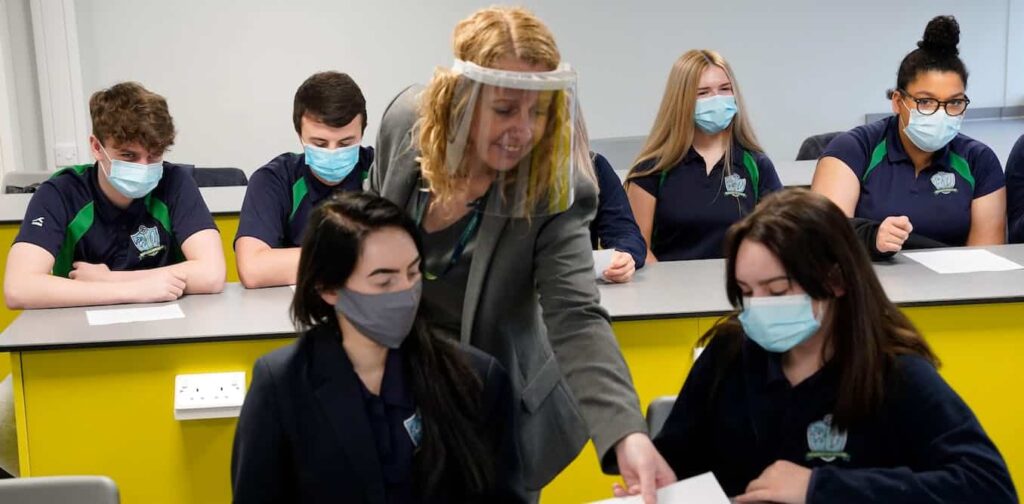[ad_1]
COVID-induced school closures in 2020 resulted in the the vast majority of pupils in England – at key and secondary amount – missing close to 40 times of university on website. Educational facilities all-around the globe ended up likewise afflicted, however to diverse extents.
As modern figures from the Organisation for Economic Cooperation and Improvement display, in the initial 12 months of the pandemic, 1.5 billion college students in 188 international locations and economies weren’t equipped to go to college, for varying lengths of time. Figures from the Netherlands and Ireland are very similar to those people in England. In Denmark, college students skipped closer to 20 days, while the numbers are considerably bigger in Costa Rica (near to 180 days) and Colombia (around 150 days).
Whilst most English faculties all through this time furnished some kind of distant education and learning, these closures nevertheless resulted in understanding losses. As a end result, amid the United kingdom government’s programs for submit-COVID college recovery, the Section for Instruction has reportedly discussed extending the school day, by possibly lifting the existing cap on the selection of hrs condition university lecturers can be questioned to do the job.

EPA-EFE/LISELOTTE SABROE
Intercontinental proof looks to suggest that, in some instances, a lengthier university working day may possibly be beneficial. A report by the United Nations-led Accelerated Instruction Operating Group has proposed various methods to deal with pandemic-induced mastering losses. These selection from extending training time to employing formal capture-up programmes with remedial education for struggling pupils. Extending teaching time was proposed as an correct tactic when pupils have skipped out on up to a person 12 months of education and learning.
What’s more, experiments these types of as individuals performed in the US and Canada and in Chile support the plan that extending instructional time could assistance pupils, each in the limited and very long term. They would profit both academically (in phrases of attaining bigger exam scores and higher instructional attainment) and socio-economically (their foreseeable future earnings would be greater).
Nonetheless, a review of studies in Latin America and the Caribbean mentioned that, even with these added benefits, there may well be a lot more expense-efficient means to attain related effects. An extra and important thing to consider would be the psychological cost to instructors.
Overburdened workforce
Of course, a for a longer period university working day usually means far more teaching several hours. And that raises the concern of no matter whether asking teachers to prolong their functioning working day is a realistic ask for.
In accordance to federal government rules, teachers at condition educational facilities in England can be asked to educate up to a greatest of 1,265 hrs in excess of 195 days of the yr. This selection does not include things like extra several hours expected for tasks, these kinds of as lesson arranging, evaluating, checking, recording, and reporting.
Information from four surveys demonstrates that, pre-pandemic, an normal whole-time teacher in England worked 50 several hours a 7 days in term time and all around four hours a week during the holiday seasons. There are undoubtedly outliers, like 10% of full-time teachers who described doing the job at least 30 hrs for each week in excess of the summer season and 50 %-term holiday seasons and 15 hrs above the Xmas holidays. The scientists also found that the selection of reported doing the job hours had not lessened in excess of 25 yrs. In fact, teachers in England have been discovered to function extended several hours than most other countries, with decreased secondary university academics performing around 8 hours far more for every 7 days
Our ongoing investigate into what being a teacher all through the pandemic has been like displays academics truly feel disappointed. The participants we have interviewed have relayed their distress at how the media and some sections of the public have portrayed their occupation as lazy.
And the quantities bear out their disappointment at that misguided impression. A study conducted in June/July 2020 by the Uk charity Schooling Support identified that 31% of lecturers and 70% of senior school leaders documented performing more than 51 hours for every week on typical.
Due to the fact March 2020, lots of lecturers throughout the globe have had to oscillate involving partial college closures, partial reopenings and comprehensive reopenings. To adapt, they have experienced to fast find out new competencies in buy to be capable to educate pupils from home.

insta_pictures
They have also completed a lot a lot more than just instruct. They have on a regular basis called, and in some situations frequented, pupils and their people to evaluate and meet their educational and welfare requirements. Specified the ongoing uncertainty of the predicament, it is not stunning that we discovered that our trainer participants’ psychological wellness and wellbeing had declined in excess of the training course of the pandemic.
While there may possibly be added benefits to pupils in extending the university working day, just one must be cautious of the costs this would incur to teachers’ psychological wellness and wellbeing. Pupils would not advantage from remaining taught by teachers who are pressured and burned out. For any instructional recovery program to be successful, it is significant to contemplate teachers’ requirements and perspectives.
Meet Our Successful Graduates: Learn how our courses have propelled graduates into rewarding
careers. Explore their success stories here!
Discover More About Your Future: Interested in advancing your teaching career? Explore our
IPGCE, MA, and QTS courses today!

Explore Our Courses: Ready to take the next
step in your education journey? View our
comprehensive course offerings now!

